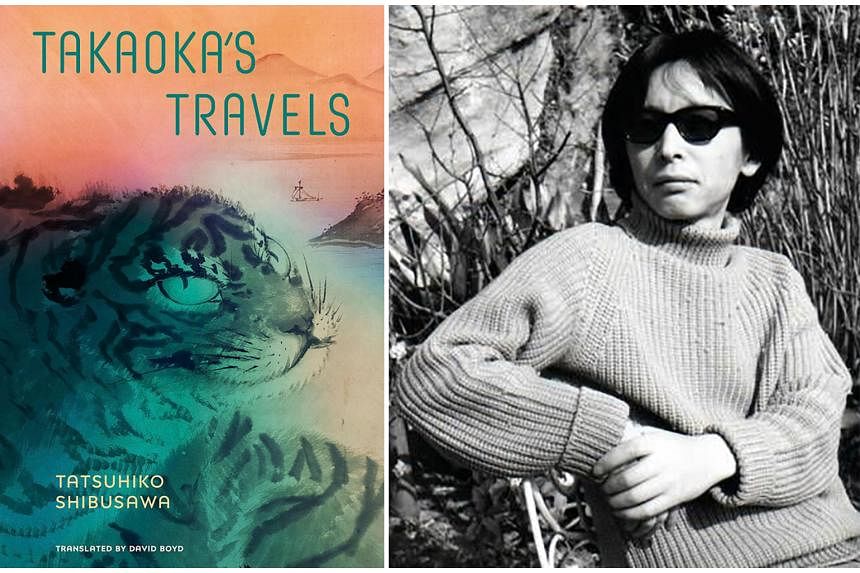Takaoka’s Travels
By Tatsuhiko Shibusawa, translated by David Boyd
Historical fiction/Stone Bridge Press/Paperback/178 pages/$21.47/Amazon SG (amzn.to/4aONaNb)
3 stars
The late Tatsuhiko Shibusawa, who died at the age of 59 in August 1987, was a larger-than-life figure in his native Japan.
As a translator of French literature, he was the subject of a public obscenity trial from 1960 to 1969 that was fought all the way to the Supreme Court. This involved his translation of the novel Juliette (1797) by French writer Marquis de Sade, which bore explicit scenes.
Shibusawa would often saunter into court wearing sunglasses and smoking a pipe – if he even showed up at all – and was respected by luminaries such as fellow writer Kenzaburo Oe, who spoke in his defence. He was eventually fined the equivalent of less than $300 today.
Apart from the controversy, Shibusawa was also a prolific essayist, his Japanese short stories dealing with themes such as dreams, fantasy, the occult and – unsurprisingly – eroticism.
All these feature in Takaoka’s Travels, his only full-length novel whose English translation will be released on May 14, according to his publisher’s website.
Shibusawa completed Takaoka’s Travels, a work of historical fiction, in hospital and the book was released two months after his death from the rupture of a carotid artery aneurysm. The book posthumously won him the prestigious Yomiuri Prize and continues to carry literary significance to this day.
Shibusawa – incidentally a distant relative of Eiichi Shibusawa (1840-1931), the industrialist regarded as the father of Japanese capitalism – evokes surreal dreamscapes as the protagonist Takaoka and his entourage journey through exotic faraway lands, including the lush tropics of South-east Asia and Singapore.
These worlds come alive under the hands of translator David Boyd, who previously worked on Mieko Kawakami’s global hit Breasts And Eggs (2020) and won a translation award for his work on Takaoka’s Travels.
The book is based on the life of Prince Takaoka (799-865), who was briefly made Crown Prince as a 10-year-old boy from 809 to 810, before he was deposed in an insurgency among rival imperial clans.
He eventually became a monk and founded a temple that still stands on Mount Koya – Japan’s home of esoteric Buddhism in Wakayama prefecture – but wanted to venture abroad in search of further enlightenment.
Historical records show that Takaoka had gone to Tang Dynasty (618-907) in China and, at the age of 65, had begun a journey towards Hindustan when he died, supposedly from a tiger attack.
But Takaoka’s encounters along the way are a blank slate which Shibusawa fills in with his vivid imagination, as Takaoka and his entourage meet indigenous tribes and magical beasts at every turn.
Among the characters are talking dugongs, an albino ape who guards a harem of bird-women, beasts who feed on dreams and prophetic dog-headed men who are forced to wear a bell as a chastity belt.
Shibusawa has plenty of fun weaving in anachronisms and supernatural developments. In one case, Takaoka and his entourage meet a talking anteater, who chides them for “anthropocentrism” after they assert that the anteater must not be real for it had yet to be discovered.
“It’s foolish to think that the existence of my kind hinges upon being ‘discovered’, as you put it, by (explorer Christopher) Columbus or by any other man,” the talking anteater says.
Singapore, in a brief mention, is described as “desolate and overrun with dense tropical plant life (with) what appeared to be the stony remains of an ancient port”.
Along his journey, Takaoka witnesses impurity of the highest order – death, sex, even bestiality – in his pursuit of nirvana, and survives crooks, hallucinations and an attack by ghost pirates.
In that last encounter, Takaoka swallows a pearl to prevent it from being stolen, losing his voice when it is lodged in his throat.
It is here that Takaoka appears most resigned to his fate as, in a reflection of real life, Shibusawa likewise was silenced when his vocal cords were sliced off as he suffered a rare form of throat cancer.
Takaoka’s Travels is deliberately evocative and its explicitness may discomfort some readers, but it is at its heart a pilgrimage through unfamiliar experiences towards an inevitable end.
If you like this, read: The Rainbow by Yasunari Kawabata, translated by Haydn Trowell (2023, Penguin Classics, $25.41, Amazon SG, go to amzn.to/4aSOxug). This is another pivotal Showa Era (1926-1989) work by the Nobel Prize in Literature winner. The Rainbow, serialised from 1950 to 1951, is a quiet contemplation of Japan’s psychological, emotional and spiritual aches after World War II.


